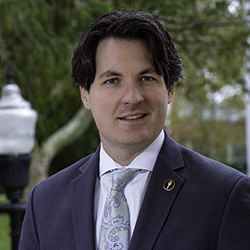Meet Sean Fischer
Meet Sean Fischer
Meet Sean Fischer
 Sean Fischer ‘05
Sean Fischer ‘05
Major: History
Current Occupation/Job title: Associate Dean for External Affairs
Company: Rowan University, Henry M. Rowan College of Engineering
What are your job responsibilities?
To engage external audiences through advancement (PR/philanthropic donations) that can enhance our research and academic goals. I manage externally facing events, serve as a program ambassador to various constituencies, develop relationships with other academic institutions, and liaison with various university divisions and programs.
What do you like about the work you are doing now?
I do a considerable amount of writing, translating highly technical information for mass audiences. Things that are outside of the traditional engineering mindset. Prior to my current position, I participated in various political jobs and campaigns, which led to a position as a Development Officer at the Atlantic Cape Community College. While there, I was promoted in the development office, and eventually was promoted to college’s senior staff as Chief of Staff to the President. I retained those responsibilities, while assuming the positions of Chief Advancement Officer and Executive Director of the College Foundation, Secretary to the Board of Trustees.
What do you consider the most essential skills for this career?
The ability to quickly and effectively analyze various data, often incomplete data to develop inferences. Understanding the broader fabric of public life in a qualitative sense enables me to prepare students and faculty to engage with non-engineers and develop their understanding of driving forces for industry and government.
How do you think your major/academic experience prepared you for your career?
My time at Rowan was not only rewarding in the classroom, but also afforded me the opportunity to lead student organizations, which nurtured presentation, budget management, and delegation skills. Academically, having studied history, I was armed with an appreciation of the past and its relevance in the present and to the future. Through that experience I was introduced to and was able to develop insight into different cultures, which broadened my understanding of the world and enabled to develop an understanding of the “who” “where” and “why” engineers and scientists do the “what” and the “how” that they do it.
Describe any internships you held that were helpful in your job search.
I took an internship class in the history department where I learned interviewing and transcribing for the cataloging of primary source material. That was instrumental as I went through graduate education. I also immediately interned in the office of a United States senator upon graduation where I quickly was given a full-time job on a political campaign – that opportunity led to every other career opportunity I have since received.
What advice would you give students interested in your field?
Consider how you want to make an impact, rather than simply focusing on “where” you will find a job. Data analysis, cultural awareness, writing, critical thinking and understanding the quality of source material are not skills possessed by everyone. They are by those of us who study the humanities and the social sciences. Now more than ever, are those skills important and in demand.
What do you enjoy doing when you’re not working?
Reading, writing, sports enthusiast, travel
Fun fact about you?
I am an identical twin



